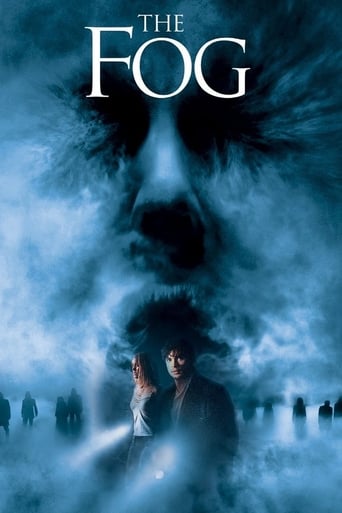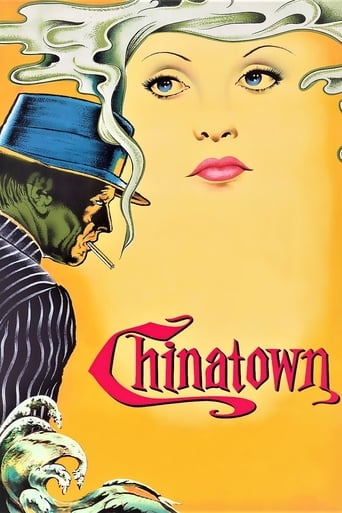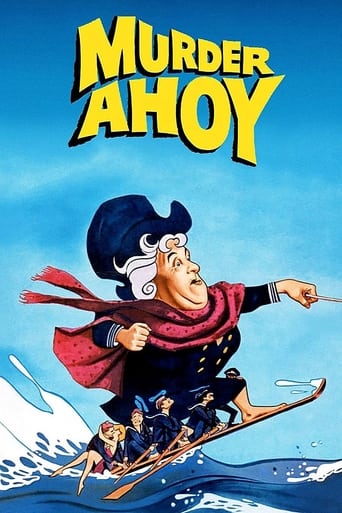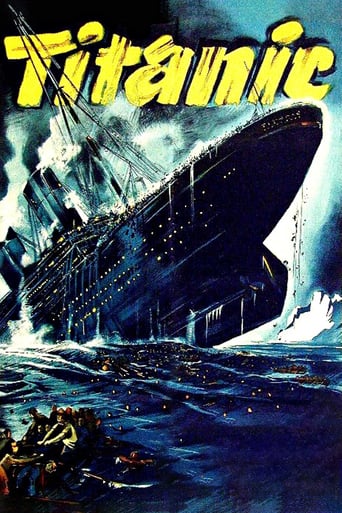
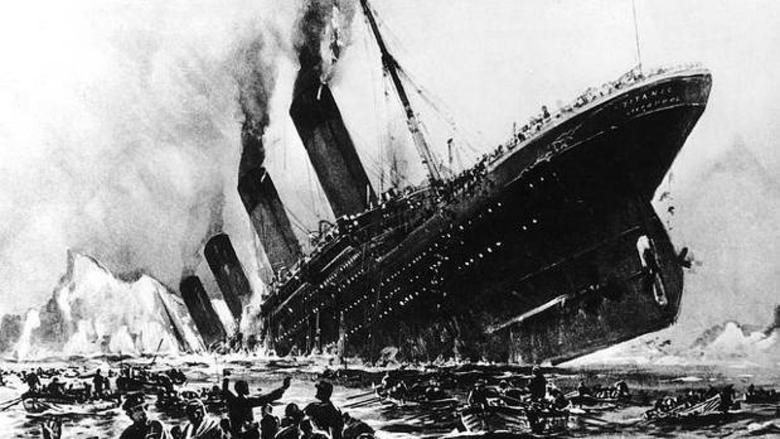
Titanic (1943)
This little-known German film retells the true story of the British ocean liner that met a tragic fate. Ernst Fritz Fürbringer plays the president of the White Star Line, who unwisely pressed the Titanic's captain (Otto Wernicke) to make the swiftest possible crossing to New York.
Watch Trailer
Cast


Similar titles
Reviews
"Titanic" is a German 1943 film, so this one is almost 75 years old. it was made in Germany, during the days of World War II, so you probably know already that the film has its fair share of propaganda too, even if most of it is not as obvious as other films from that era. "Titanic" runs for slightly over 80 minutes and gives us an insight into Nazi Germany's idea of how the ship sank and who is really responsible for it. It is actually quite ironic how they are trying to tell us that those (Jews, of course) responsible for it were not only not punished but profited from it while exploiting this catastrophe themselves. There are some prolific actors from back in the day in here, but none of them are really famous anymore today. This is a sound film and it's actually okay to listen to compared to other sound films from a couple years earlier. The industry has certainly advances fairly quickly, not only in the United States, but also in Europe.The most interesting thing about the movie is probably the background story involving writer and director Herbert Selpin. Unhappy with the impact the Propaganda Ministry had on the film, he was quite vocal about his concerns and thought on the entire political climate. The consequence was that he got arrested and most likely killed while making it look like a staged suicide. Official comments indicated anyway that he was about to be sentenced to death soon. As spectacular as all this may seem, none of the film is really spectacular or memorable. I found it a pretty boring watch for the most part and only a few scenes were interesting, certainly not enough for a film that crosses the 80-minute mark. The acting is also really mediocre. I do not recommend watching this film here. Quick little note: When this was made, James Cameron wasn't even alive yet.
"I watched Titanic when I got back home from the hospital, and cried. I knew that my IQ had been damaged." - Stephen King There are many films about the HMS Titanic and her tragic sinking, but the main 4 are "Titanic", a German propaganda film released in 1943, Jean Negulesco's "Titanic", released in 1953, "A Night To Remember", released in 1958 and regarded by many to be the "definitive Titanic movie", "Raise The Titanic", a ridiculous movie released in 1980, and 1997's "Titanic", James Cameron's box office juggernaut.The 1943 film was directed by Werner Klingler and Herbert Selpin, and eschews historical accuracy in favour for some hilarious German propaganda. The film portrays the crew and wealthy passengers of the Titanic, as well as the chairmen and managing directors of the White Star Line, as being slimy and despicable, concerned only with winning awards, profit, setting records and making money. Everyone in the film bullies servants, makes terrible decisions and is corrupt and incompetent, except for Hans Nielsen, the ship's German First Officer. Nielsen is not simply the only righteous member of the Titanic's crew, but the only person in the film who realises that the actions of those around him will lead to certain disaster.And so the film treats the HMS Titanic, her collision with an iceberg and subsequent sinking, as an allegory for western capitalism, which, like the titular ocean liner, is bloated, accelerative and heading for crisis. The film makes this most explicit by using the upper and lower decks of the ship to highlight social stratification (the rich hobnob on the upper decks while the poor live in steerage compartments), whilst the Titanic's sinking, which was due to the ship travelling too fast in order to break naval records, is shown to be the result of businessmen who were using the ship's lunge for the record books to drive up stock prices.The film ends with the words "The deaths of 1500 people remain unatoned for, an eternal condemnation of the English quest for profit", and then mourns the fact that the underprivileged died whilst those responsible for Titanic's crash escaped Scott-free, fleeing on lifeboats and buying their way out of subsequent law suits (the film is structured as a flashback within a courtroom), a salvation akin to the financial crisis of 2007-2010 and the ensuing bank bailouts (in real life, economic lifeboats are given innocuous names like "Emergency Economic Stabilization Acts").Ironically, the film was quickly banned in Germany, German propaganda minister Joseph Goebbels deciding that the ship's sinking too closely mirrored the fall of the Third Reich. Director Herbert Selpin was himself executed for expressing anti military sentiments.Unlike the German version of the tale, the 1953 "Titanic" has little to offer modern audiences. The film focuses on an estranged couple who are journeying to America. She wants to escape the confines of his high society life in Europe and he gradually learns to let her go. Of course the ship then sinks, putting an end to their petty squabbles.In contrast, "A Night To Remember", released five years later, holds up really well. A mosaic of short scenes, the film is a near documentarian account of the Titanic's launch, maiden journey and sinking. Director Roy Baker offers us glimpses into the lives of a myriad of characters, the film stressing the collective rather than the individual nature of the experience.Like most "Titanic" films, Industrial Age hubris is a big theme, but unlike most of these flicks, the film is more preoccupied with the ship's class divisions. This is made clearest during two sequences, the first in which we jump to and from characters of varying economic standing, and observe the various ways they journey to the ship itself (horses, trains, mules, cars, foot etc), and the second in which the different classes mingle or are forced into lifeboats together, the sinking of the Titanic symbolising the collapse of structured society and the crumbling of the British class system.Unlike the 1953 film, in which almost everyone is American, this is thus a very British film. It's a British production with British actors playing everyone including the Americans, and is one of many early post war British films to react to decolonisation and the dismantling of the British Empire.Social conscience is exactly what 1980's "Raise The Titanic" lacks, the film mostly interested in gimmicks and spectacle. It's a worthless film, notable only for its shots of submersibles, submarines, underwater camera drones and its plot which revolves around a group of salvagers who attempt to resurrect the Titanic, raising her barnacled carcass up from the ocean depths.James Cameron's 1997 "Titanic" is, of course, the big Titanic film which everyone is familiar with. What's interesting is how Cameron pulls subplots, scenes and whole sequences from all the previous Titanic movies. Cameron's bookends with the salvagers, treasure hunters, submersibles and camera drones comes from the 1980 film, whilst the love story, blue diamonds, jewels, villains, accusations of theft, bossy parents, arranged marriages, class constricted heroine (and the fiancé she doesn't love) and free-spirited hero come from the 1958, 53 and 43 films.All those memorable individual shots in Cameron's film of praying characters, ship-builders fine-tuning clocks, children and mothers on beds as the water rises, lovers separated by lowered lifeboats etc etc, are also all pulled together from the previous films.Pretty much the only unique thing about Cameron's film is its spectacular climax. Made after research dives ascertained that the Titanic broke in two before sinking, Cameron's film is the only Titanic movie which details how the ship sank in "sections". And while the other films simply show the ship sinking from afar, Cameron's is a very spatial movie, treating us to a range of complex shots and staggeringly elaborate action sequences as the ship sinks.7.5/10 – Worth one viewing.
Titanic (1943)Goebbels takes on the Titanic. And loses. In fact, the movie languished in hiding or in bad t.v. versions until 2005.This is the most expensive German film to date, and its technical competence pales next to American films of the same period. It uses the sinking of the Titanic as a vehicle to criticize the avarice of capitalist England, their enemy at the time. So along with the usual drama of love and chivalry and overconfidence, there is a story of stock trading and of racing the ship at top speed in order to break the record and raise the company's value per share.All of which isn't totally improbable, and as a weird Nazi view of the world it's pretty fascinating. In truth, it's not a bad film. But in truth, it's not something you need to bother with unless the political propaganda aspects sound appealing. Or unless you are just curious about different film versions of the events. The effects here are vivid and often very realistic until they show the ship from the water. The interpersonal acting is uneven and a bit stiff going, usually, with some caricaturing used as a way to avoid character development.If you want a classic older Titanic film for the pure drama of the disaster, I suggest the 1958 A Night to Remember (a British production) over the American 1953 Titanic which has star power but is boring by comparison. Of course, there is the 1997 version, in color, which has its own problems and dazzlements. But stop to at least imagine what the Nazi regime could possibly have been thinking, spending a ton of money on an unlikely movie just as the tide is turning against them in the war. And watch how terrific they paint the one German officer on the ship, telling the truth and saving lives like no one else. Propaganda, for sure, but not a horrible movie, as a movie, either.
This obscure film version of the Titanic Tragedy easily ranks with the big budget Hollywood productions. Filmed during the dark days of WWII, this German effort lacks none of the luster or acting quality of important cinema produced under less stressful conditions.The film shows some obvious political propaganda, aimed at pointing out the "greed and ruthlessness" of British stock market speculators. This story angle is an interesting one, as the focus is not only on the human drama and several sensitively portrayed love stories, but also on placing blame for the loss of 1,500 human lives on a few greedy men.I can highly recommend this version of the tragic, yet fascinating story. Far above most films produced with equal or better resources. The 1943 German film "Titanic" will continue to dazzle generations of movie lovers to come!










